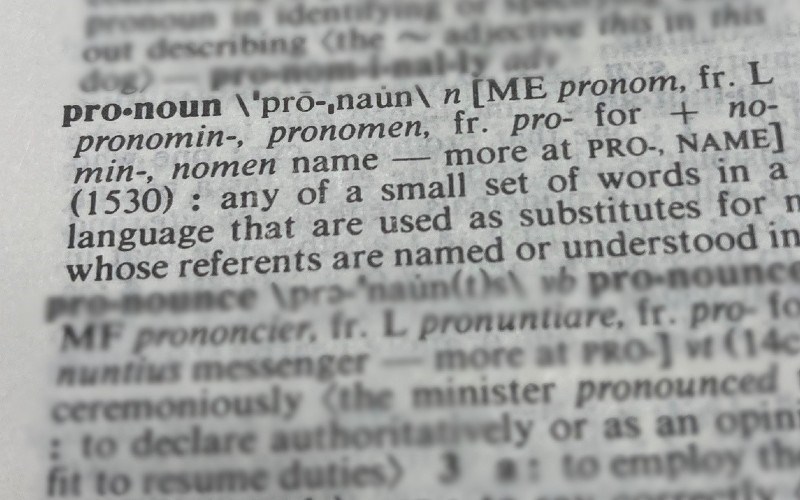The transgender rights issue has been a hot news item this year – whether it's been in efforts to protect the integrity of girls' and women's sports, a transgender female attacking a biological female guest speaker on a college campus, or in the conversation after a transgender male blasted through the door at a Nashville Christian school and killed six people.
Days later a laid-off Louisville bank employee shot up his work place, killing five. He reportedly emphasized personal pronouns on his social media accounts.
Acquiescing to personal pronouns because one doesn't want to offend someone is the wrong response for Christians, an author and former college professor said this week on Washington Watch with Tony Perkins.
Rosaria Butterfield holds a PhD from Ohio State and formerly served in the English department and women's studies program at Syracuse. A former lesbian, she received Christ in 1999. Now a homemaker and lecturer, she authored the book "The Secret Thoughts of an Unlikely Convert" and is working on a fourth book which is set for an August release.

The personal pronouns discussion, she said, should not be taken lightly.
"It's really quite deceptive, which is how Satan works," Butterfield told Washington Watch guest host Jody Hice. "It's about conceding the moral language to the Left's understanding of identity politics rather than offering a biblical understanding of morality and hope."
Transgenderism may be on the rise, but it's not a new topic. It cost a Christian doctor his job in Great Britain in 2019.
European, American courts side with pronouns
Dr. David Mackereth was let go from his position with the Department for Work and Pensions for refusing to use a transgender patient's preferred pronouns. He said his beliefs regarding the sexes were based on Genesis 1:27, which says we are "born male and female."
Mackereth sued and lost, then on appeal gained a split decision though not enough to be restored to his job. The Employment Appeal Tribunal ruled his beliefs were protected under Great Britain's Equality Act of 2010 but also ruled he was entitled to express those views at work.
The lower court's ruling stated that Mackereth's beliefs were "incompatible with human dignity and conflict with the fundamental rights of others."
 A similar case is working its way through American courts. Just last week a federal appeals court ruled that an Indiana school district did not violate the rights of a former music teacher when it required him to address students by their preferred gender names and pronouns.
A similar case is working its way through American courts. Just last week a federal appeals court ruled that an Indiana school district did not violate the rights of a former music teacher when it required him to address students by their preferred gender names and pronouns.
John Kluge told Brownsville High School Principal Bret Daghe on the first day of classes in 2017 that he had an issue with using transgender students' preferred names and pronouns on the basis of his faith. Daghe told Kluge to address students by their last names, but the transgender students said that caused them to feel singled out.
The situation grew until the local school district enacted a new policy requiring all teachers, including Kluge, to address students by their preferred names and pronouns.
Kluge's attorney, Rory Gray of the Alliance Defending Freedom, says his client is considering next steps.
Christians need to understand that for the user, personal pronouns serve a distinct purpose. "They are ideological, not terminological," Butterfield explained.
In her own life, Butterfield felt repentance was the appropriate response once she identified transgenderism as the sin of breaking the 10th Commandment: You shall not covet.
"You are not to covet your neighbor's wife, and you're not to covet your neighbor's sexual anatomy," Butterfield said.
Avoiding the conversation preserves a temporary calm, she acknowledged, but puts children in the line of fire as transgenderism targets youth.
"We are called to be salt and light, and we're not going to get there by being a soft presence," Butterfield said. "The whole soft presence idea has really backfired every single time. Christians have no business being cowardly and sinful on this issue right now as I was for so many years."
A transforming gospel is getting distorted
Two weeks ago, the White House celebrated the Transgender Day of Visibility with a proclamation from President Joe Biden who cited the "millions of transgender and non-binary Americans." A study by the UCLA School of Law in 2022 estimated that 0.6% of people ages 13 and older identify as transgender.
"We're a couple of days past the Transgender Day of Visibility with our president falsifying what the image of a Holy God means," Butterfield said. "We are in an emergency and need to treat it as such. I speak to people whose children are trapped in transgenderism, many of them living in states where the laws are protecting the child abuse and not parental rights."
She warns that a weak response by Christians distorts the message.
"Instead of a gospel that really changes people, that transforms peoples' lives, you see a kind of gospel of pluralism and therapy," Butterfield said. "That's vile, that's dangerous, and it's cowardly."
Read Rosaria Butterfield's recent, related column:
Why I no longer use transgender pronouns – and why you shouldn't, either







